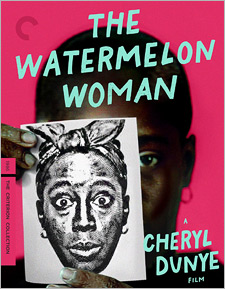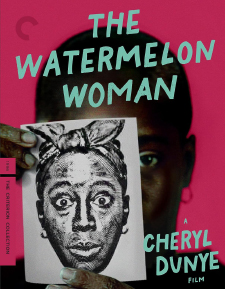Watermelon Woman, The (Blu-ray Review)

Director
Cheryl DunyeRelease Date(s)
1996 (July 11, 2023)Studio(s)
First Run Features (The Criterion Collection – Spine #1184)- Film/Program Grade: B
- Video Grade: A
- Audio Grade: B+
- Extras Grade: A
Review
The Watermelon Woman, from first-time feature film director Cheryl Dunye, is about a quest by a filmmaker to learn about the history of a Black actress who appeared in servant roles in Hollywood movies of the 1930s and 1940s.
Dunye plays a version of herself, a 25-year-old black lesbian filmmaker who happens on an old movie called Plantation Memories and discovers a beautiful, talented, Black actress credited only as “The Watermelon Woman.” Fascinated, she attempts to research the career of the woman but she’s frustrated by the dearth of information in pre-Internet days, scarce and disorganized files, apathy, and large fees for access to archives. So she sets out to unearth information about the actress in innovative ways.
Interspersed with her search, we see Cheryl at her job in a video store, which she’s gotten through fellow worker Tamara (Valarie Walker). Cheryl falls for video store customer Diana (Guinevere Turner), an affluent white girl and soon the two young women find themselves in a romantic lesbian relationship which includes graphic scenes of them, totally naked, in bed together. These scenes are treated matter-of-factly and Dunye included them because they are natural extensions of the women’s relationship. These sequences caused controversy in certain quarters when the film was initially released.
Dunye often speaks directly to the camera about her efforts. Her character is immediately likable with her enthusiasm, self-confidence, and sense of humor. As she perseveres, she discovers that the Watermelon Woman’s name is Fae Richards (Lisa Marie Bronson) and she likely had an affair with her white female director. This fact resonates significantly with Cheryl.
Dunye created her own silent “archival” black-and-white film clips for her movie, complete with scratches to add credibility. These clips are interspersed with the main action, offering a serious variation on the typically comic mockumentary.
For a first feature, The Watermelon Woman was a brave choice. It covers territory seldom seen in movies—the day-to-day life of a Black lesbian. Adding the similarly interracial aspect of Cheryl’s relationship and Fae’s ties the stories of the two women together and illustrates how attitudes have changed. When once the revelation of lesbianism meant career suicide, Cheryl’s open lesbianism shows that in today’s society she can be who she’s openly while pursuing a profession she loves.
Dunye never lectures on her themes. Representation, our relationship to problematic art of the past, interracial dating, and who tells the story are all present, but there’s no preaching. Dunye shows how these issues figure in our daily lives. Language is often laced with four-letter words. The script might be overwritten in terms of dialogue, since some is repetitive or extraneous, as when ideas can communicate visually.
As director, producer, writer, and star Dunye has fashioned a briskly paced, often comical look at serious issues. Her Cheryl is an endearing screen presence who navigates us through her personal quest to learn about a Black actress from decades ago. She’s her own detective out to solve a mystery, and her journey of discovery reveals clandestine realities and attitudes toward race and non-traditional sexuality that limited what a talented individual could aspire to.
The Watermelon Woman should not be confused with The Watermelon Man, a 1970 comedy starring Godfrey Cambridge as a bigoted white man who finds out firsthand what it’s like being a Black man.
The Watermelon Woman was shot by cinematographer Michelle Crenshaw on video and 16 mm film (to create the “archival” footage) and presented in the aspect ratio of 1.33:1. According to information in the enclosed booklet, the digital restoration “was created in 2K resolution from the 16 mm A/B negatives.” Video footage is sharp and extremely well detailed. The 16 mm “archival footage” is intentionally made to look old, slightly damaged, and filled with shaky camera sequences (for simulated home movies). Dunye steps out of the narrative, a la George Burns, to talk about her process. Actual places in and around Philadelphia serve as locations in the film.
The soundtrack is English 3.0 Surround DTS-HD Master Audio. English SDH subtitles are an available option. The original 3.0 surround soundtrack was remastered from the 1/2-inch digital audiotape. Dialogue is clear and distinct throughout. Paul Shapiro’s original music gives the low-budget film stature and provides emotional underscoring.
Bonus materials on this Director-Approved Blu-ray release from The Criterion Collection include the following:
- Meet the Filmmaker: Cheryl Dunye (16:10)
- Cheryl Dunye and Martine Syms (19:14)
- Alexandra Juhasz and Thomas Allen Harris (23:24)
- Six Short Early Films by Cheryl Dunye:
- Janine (9:08)
- She Don’t Fade (23:53)
- Vanilla Sex (3:59)
- The Potluck and the Passion (21:48)
- An Untitled Portrait (3:19)
- Greetings from Africa (9:31)
Meet the Filmmaker: Cheryl Dunye – Cheryl Dunye discusses her background, her career, the making of The Watermelon Woman, and the National Endowment of the Arts controversy surrounding the film. Dunye speaks about her choice of Philadelphia as her primary filming location because it has been a destination for Black people. The city is rich in everything that the broader culture wasn’t telling her. Her job was to make the work matter. Clips from Dunye’s early short films are shown. She received a grant and did some research, discovering there were no features about interracial lesbian relationships. She discusses how she created the “archival” footage that appears in the film. The film was shot entirely outside Hollywood.
Cheryl Dunye and Martine Syms – Dunye speaks with artist and filmmaker Martine Syms about their respective work and issues of identity and representation in queer Black cinema.
Alexander Juhasz and Thomas Allen Harris – The Watermelon Woman producer and film scholar Juhasz talks with artist, filmmaker and scholar Harris about family, identity, and the significance of archiving in the film. She speaks about the romantic relationship she shared with director Cheryl Dunye.
Janine – This 1990 film, directed by Cheryl Dunye, is the story of a Black lesbian’s relationship with a white, upper middle class high school girl.
She Don’t Fade – Made in 1991, this is a self-reflective look at the sexuality of a young Black lesbian. The film focuses on Shae Clarke (Cheryl Dunye), who defines and demonstrates her “new approach to women.”
Vanilla Sex – Sex is not always hard, fast, intense, rough or kinky. Sometimes sex is soft, gentle, and deeply relaxing. This kind of sex is called vanilla sex, and a lot of people really love it. From 1992.
The Potluck and the Passion – Sparks fly as racial, sexual and social politics intermingle at a lesbian potluck in this 1993 film.
An Untitled Portrait – In this 1993 short, filmmaker Cheryl Dunye’s relationship with her brother is examined in a combination of appropriated film footage, super 8 mm home movies and Dunye’s special brand of humor.
Greetings from Africa – Cheryl Dunye, playing herself, humorously experiences the mysteries of lesbian dating in the 90s.
Booklet – The accordion-style booklet contains the critical essay Faking It! Making It! by Cassie Da Costa, cast and crew listing, color photos from the film, and information about the film’s digital restoration.
Dunye’s mockumentary-style structure conveys a lighthearted tone as she explores the history she herself creates, including specially minted archival footage. The film sometimes feels cobbled together from bits and pieces, and this is likely due to Dunye dealing with feature-length story telling for the first time. With witty commentary on white feminism, how film can be a source of disillusion, and racism—both personal and the Hollywood kind—The Watermelon Woman is a breezy look at how many parts of history are simply ignored, depending on who’s recording the history.
- Dennis Seuling

